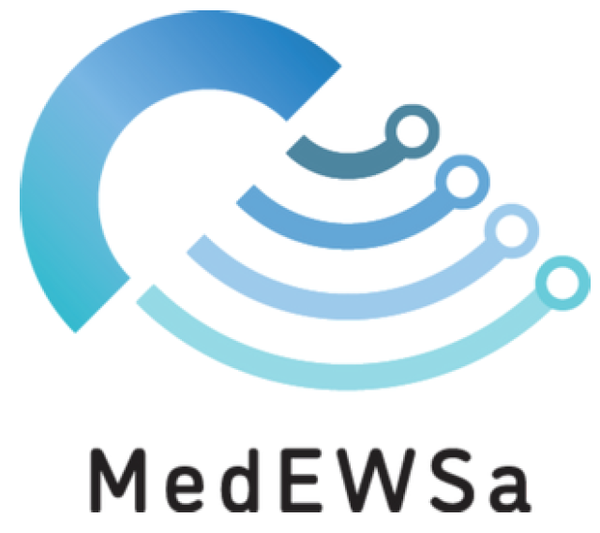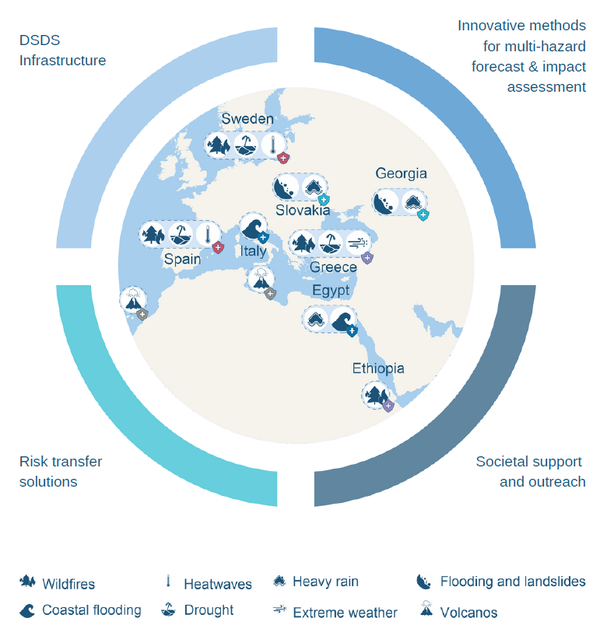HORIZON Innovation Actions, funded by the European Research Executive Agency

|
MedEWSa delivers a network of effective and interoperable MHEWS spanning across the Mediterranean basin and its adjacent countries. Itbuilds on existing infrastructures, fills gaps, and harmonizes through innovative technologies. Particular attention is paid to current and merging extreme event hotspots, vulnerable areas, and at-risk communities. |
|
 |
As exemplified during 2023, the European and African countries adjacent to the Mediterranean basin are particularly exposed to natural hazards including extreme weather events. To enhance resilience and alleviate the impact of such hazards, coordinated preparedness and response mechanisms must extend beyond administrative and geographic regions. The MedEWSa project (2023-2027), which has secured €5m of funding from Horizon Europe, develops a connected system of Multi-Hazard Early Warning Systems (MHEWS) that supports first responders and facilitates informed decision-making. In doing so, it directly contributes to the United Nations' Sustainable Development Goals and enhances the European Union's competitiveness and growth. |
MedEWSa Pilots
|
MedEWSa contributes directly to the United Nations Secretary General's Early Warnings for All initiative, will contribute to the standardization and implementation activities of the UN Focus Group on AI for Natural Disaster Management, and involves important stakeholders and research institutes in Greece. The greater Mediterranean basin, Europe and Africa, are warming rapidly and are increasingly susceptible to a range of natural hazards and extreme weather events that transcend national boundaries. These events encompass prolonged heat waves and droughts, heavy rainfall, volcanic eruptions, and storm surges or coastal flooding. In 2023, a sequence of large scale regional incidents, including floods and wildfires, resulted in significant loss of life and extensive damage to critical infrastructure, ecosystems, and socio-economic sectors. These devastating and high profile occurrences underscore a pressing necessity for innovation in coordinated preparedness and response mechanisms across administrative and geographic regions, to enhance resilience and alleviate the impact of such events. The MedEWSa project, from 2023 to 2027, aims to develop Multi-Hazard Early Warning Systems (MHEWS) to support first responders and augment decision-making in the fast moving crisis management situations caused by natural hazards and severe weather events. |
|
This initiative has secured €5m of funding from Horizon Europe, the European Union's primary research and innovation funding program, which is dedicated to addressing climate change, facilitating the attainment of the United Nations' Sustainable Development Goals, and enhancing the European Union's competitiveness and growth.
|
|
Principal Investigator at JLU |
Staff |
|||
|---|---|---|---|---|
|
Center for International Development and Environmental Research (ZEU) Justus-Liebig-University, Giessen (Germany) Department of Geography |
|
|||
Consortium |
|
World Meteorological Organization (coordinator) |
|
National Observatory of Athens |
|
Fondazione Centro Euro-Mediterraneo sui Cambiamenti Climatici |
|
Sveriges Meteorologiska och Hydrologiska Institut |
|
Slovak Hydrometeorological Institute |
|
European Centre for Medium Range Weather Forecasts |
|
Hellenic Ministry of Defence - Hellenic National Meteorological Service |
|
Centro Internazionale Di Monitoraggio Ambientale – Fondazione |
|
Institut National de Recherche pour l’Agriculture, l’alimentation et l’Environnement |
|
International Red Cross-Red Crescent Centre on Climate Change and DisasterPreparedness |
|
Justus Liebig University Giessen |
|
Barcelona Supercomputing Center-Centro Nacional de Supercomputación |
|
Fraunhofer Heinrich-Hertz-Institut – Fraunhofer HHI |
|
Geosphere Austria |
|
Mitiga Solutions |
|
Internet of Things applications and Multi-Layer development |
|
Kajo s. r. o. |
|
Convergence |
|
Hellenic Ministry of Digital Governance |
|
African Union Commission |
|
Georgia National Environmental Agency |
|
Region of Attica Civil Protection Department |
|
Centro Previsione e Segnalazione Maree del Comune di Venezia |
|
Egyptian Meteorological Authority |
|
Ιtalia Meteo Agency |
|
Department of Interior of Generalitat de Catalunya |
|
Ethiopian Forestry Development |
|
Pau Costa Foundation |
|
South-East European Multi-Hazard Early Warning Advisory System (SEE-MHEWS-A) represented by the Israel Meteorological Service (associated) |
|
European Central Bank (associated) |
|
||||||
|---|---|---|---|---|---|---|
|
The project is funded by European Commission, European Climate, Infrastructure and Environment Executive Agency |
||||||

